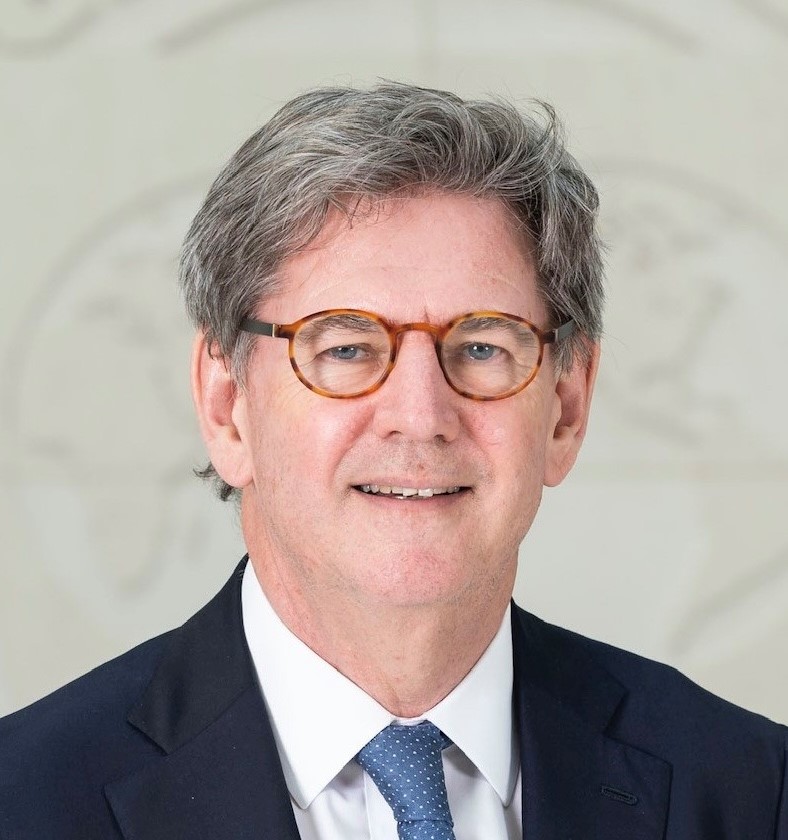The international relations in the world are shifting, which also has consequences for the International Monetary Fund (IMF) and the World Bank. In a world dealing with the consequences of climate change and an increasingly fragmenting global economy, these institutions have an important role to play. This is the message of Professor Emeritus Paul Hilbers in his emeritus speech on February 14.
The title of Hilbers’ lecture is “Bretton Woods 2.0”, a reference to the Bretton Woods Agreement. This agreement was concluded in 1944 between 44 countries, creating a new international monetary system and linking the US dollar to gold and other currencies to the dollar. The agreement led to the establishment of the IMF and the World Bank, among other things.
Prosperity
 “The goal of Bretton Woods was to reorganize the world economy, prevent trade and currency wars, and help countries develop economically. In addition, the countries wanted to prevent a global depression like the one in the 1930s as a result of World War I”, Hilbers explains. “I personally find it quite remarkable that the countries involved were already thinking about this while the World War II was still ongoing.” The Bretton Woods system remained in force until 1971. From that moment on, more and more countries began to abandon the fixed rate against the dollar, and a system of predominantly floating exchange rates emerged. The role of the IMF and the World Bank was retained, which, according to Hilbers, went remarkably well for eighty years. “International trade increased strongly and, with it, financial transactions between countries. In short, an integrated global economy emerged that led to greater prosperity.”
“The goal of Bretton Woods was to reorganize the world economy, prevent trade and currency wars, and help countries develop economically. In addition, the countries wanted to prevent a global depression like the one in the 1930s as a result of World War I”, Hilbers explains. “I personally find it quite remarkable that the countries involved were already thinking about this while the World War II was still ongoing.” The Bretton Woods system remained in force until 1971. From that moment on, more and more countries began to abandon the fixed rate against the dollar, and a system of predominantly floating exchange rates emerged. The role of the IMF and the World Bank was retained, which, according to Hilbers, went remarkably well for eighty years. “International trade increased strongly and, with it, financial transactions between countries. In short, an integrated global economy emerged that led to greater prosperity.”
Economic stability
Hilbers argues that now, eighty years later, a new ‘Bretton Woods moment’ has emerged. According to him, there are two reasons for this. “First of all, we are dealing with an increasing fragmentation of the global economy, with countries increasingly pursuing their own interests and less cooperation. This can lead to trade restrictions, political tensions and a weakening of the global economy as a whole. Second, we are dealing with the increasing economic consequences of climate change. Think, for example, of failed harvests, rising sea levels and forest fires, with major economic damage.” According to Hilbers, it is important that we realize how valuable it is that we have had an increasingly open global economy over the past eighty years. "We must prevent ourselves from going down the wrong path too easily."
Climate change
"The IMF and the World Bank have a global membership, a broad economic and financial mandate, and a strong reputation. Effectively carrying out this mandate in the current uncertain circumstances is of great importance. Besides continuing to monitor and stabilize the macro economy, these institutions can also do a lot when it comes to climate change. For example, they advise countries on economic policies that are sustainable, and help with the gradual transition to a green economy. But the IMF and the World Bank also play a role in adaptation, such as financing infrastructure that is resilient to climate change.”
Countervoice
“We are at an important crossroads in economic history and we need to think carefully about what the risks are. How can we prevent these risks and how can we convince politicians and citizens of the necessity thereof?” To achieve this, Hilbers believes that policymakers, central bankers and academics should join forces internationally. The IMF and the World Bank can exert the necessary influence and raise awareness of the dangers of fragmentation. “These organizations have shown over the past eighty years that they can respond flexibly to changing circumstances and are able to deal with a crisis. We can rely on that.”
Documents
-
Publication date 2/14/2025File size 1 MB
About Paul Hilbers
Prof. Dr. Paul Hilbers is Professor Emeritus at Nyenrode Business University, where he focuses on supervision of the financial sector. He also worked at De Nederlandsche Bank and was until recently the Dutch administrator at the IMF. As a result, he was directly involved in the shifting international relations and their economic and financial consequences.

